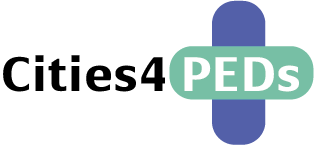Cities4PEDs
Exploring city levers to enable Positive Energy Districts (PEDs) across diverging contexts

The Project
So far, positive energy districts and neighbourhoods (PEDs) have been predominantly researched from a technological and energy perspective, often with a focus on electricity and related to new buildings. While the building level is clearly regulated with known possibilities for intervention, this is not the case for the district- and neighbourhood-level. A broader implementation of the PED concept therefore requires a special focus on legal, institutional and organisational issues and a focus on the main actors, the cities, to develop effective instruments and structures.
In Cities4PEDs, the cities of Brussels, Vienna and Stockholm collaborate with experts from research, innovation and citizen participation. They jointly investigate how cities can adapt and use their planning and implementation instruments so that urban development results in neighbourhoods that produce more energy than they consume.
In details, the project has three main objectives:
- Advancing the PED concept and definition for new and existing districts and neighbourhoods;
- Fostering PEDs through legal levers and ensuring PED qualities from planning to implementation;
- Developing approaches for effectively engaging citizens and business stakeholders.
The PED areas chosen by the partners are diverse, from existing to newly-built areas, with different backgrounds and specific issues (energy poverty, coastal area, important social housing development…). This calls for an ambitious but differentiated approach of PEDs definition.
PEDs?
A PED can be defined as “an urban neighbourhood with annual net zero energy import and net zero CO₂ emissions working towards a surplus production of renewable energy, integrated in an urban and regional energy system”, as JPI Urban Europe puts it. Cities4PEDs is cofounded by the Programme “Positive Energy Districts and Neighbourhoods for Sustainable Urban Development”, conducted by JPI Urban Europe, that aims to support the planning, deployment and replication of 100 Positive Energy Neighbourhoods by 2025.
What are Positive Energy Districts?
Positive Energy Districts and Neighbourhoods are an integral part of comprehensive approaches towards sustainable urbanisation including technology, spatial, regulatory, financial, legal, social and economic perspectives. Find out more resources from JPI Urban Europe, including a Booklet on PEDs in Europe, on the programme webpage.


